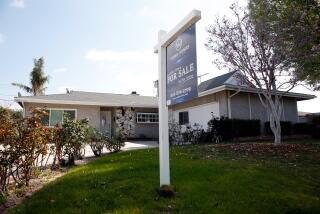It’s hot out there
The peak home buying and selling season is here, and those entering the fray might use the strategy students employ when competing for admission to top colleges: Have money saved, a loan approved, letters of recommendation in hand and think “early decision.”
“If you don’t decide on a home within 24 hours, it’s too late,” said recent Saugus buyer Tony Mora, who made offers on three homes before he and his wife finally succeeded in purchasing their three-bedroom house for $475,000. “Every time we liked a place, someone had put an offer in one hour before. It’s brutal.”
If it sounds like it’s a pressure cooker out there, that’s because it is, particularly for buyers seeking homes in the sought-after $450,000-to-$800,000 range in Los Angeles, Orange, Ventura and San Diego counties, agents say. With interest rates low, prices still rising and little on the market, it takes savvy, perseverance and a game plan to beat the competition.
“Sellers feel like they’re Solomon, looking at so many qualified buyers and having to choose who gets the house,” said Mike Cocos, an ERA North Orange County Real Estate agent. “Buyers must position their strengths.”
That means educating themselves about the community in which they hope to buy and knowing what’s available in their price range. Once they’ve zeroed in on a geographical area, they must be prepared to come to the table preapproved for a mortgage and equipped with a bank statement proving their ability to make a deposit and down payment.
To gain an edge, buyers usually must make an offer beyond what the seller is asking and have a letter available explaining why the house is perfect for them.
In a multiple-bid situation, agents say, buyers can make themselves even more attractive to sellers if they offer to double the standard 3% “good faith” deposit. Sometimes called “earnest money,” this is paid when the purchase agreement is signed and usually goes toward the down payment or closing costs. Agents also advise buyers to be flexible about the length of escrow if that is important to the sellers.
This dog-eat-dog atmosphere is being driven in part by mortgage interest rates that have remained under 6%, even after the Federal Reserve recently hiked its key short-term interest rates, for the eighth time since June. The rise in short-term rates so far has not pushed 30-year mortgage rates above 8%, a point at which some analysts would expect buyers to back off.
In addition to continued low mortgage rates, buyers who otherwise would not be able to afford homes in the Southland’s high-priced market are managing to squeeze in with interest-only loans or benefit from a proliferation of other loan packages that do not require large down payments.
“It’s everybody’s guess what will happen to rates this summer,” said G.U. Krueger, an economist for the real estate investment advisory firm IHP Capital Partners in Irvine. “Buyer expectations are the main issue: Will people buy homes because they think prices are going to keep going up?”
Most economists expect few surprises in the short term. Home prices probably will continue to rise, but in single digits, not the 17%-to-20% range owners have seen recently, said John Karevoll, an analyst with DataQuick Information Systems. Buyers waiting for a price crash probably will be disappointed.
In the $5 million-and-up end of the market, some buyers are holding off, particularly if the homes seem overpriced, said Cecelia Kennelly Waeschle, a Sotheby’s International Realty agent in Malibu. Westside teardowns in the $1-million range and homes that are buyer-ready, however, are sold almost instantly, she added.
“Some buyers waited last spring, hoping prices would go down, but they didn’t,” Waeschle said. “It’s like a train leaving the station: People want to get on at the last minute, but they end up buying anything” just to get on board.
It’s a seller’s market, and even the most conscientious buyers sometimes despair of ever finding a home.
Following all the new rules -- perfecting their financial profile and striking an emotional chord -- makes a difference only when sellers are choosing from among several equally qualified buyers, agents say. Often the decision just comes down to the buyer with the strongest financial package. Sometimes getting a home hinges on whether the top bidder backs out of the deal.
The Moras benefited from another buyer getting cold feet. Tony, a teacher, Ruthie, a homemaker, and their three kids outgrew their two-bedroom, 1,100-square-foot San Fernando home, which they bought in 1999 for $134,000. So six months ago, they began searching for a home priced under $500,000 in Granada Hills or Northridge. After looking at several houses that were too expensive or unappealing, they reluctantly gave up.
Still desperate for more space, however, they decided two months ago to try again. They sold their home for $409,000 and began to search in the Santa Clarita Valley, where their Realty Executives agent, Lynda Dulak, told them they would have better luck. They did, but only after looking at about 15 homes and being outbid on three of them.
With the close of escrow looming on their old house, the couple decided to buy a three-bedroom, two-story Saugus home with a small backyard for $5,000 above the asking price of $470,000. Although they wanted a one-story house with a large yard for the kids to play in, they decided to grab the less-desirable house when buyers who outbid them canceled the contract.
“The experience was frustrating, scary, disappointing,” Mora said. “We were ready to quit. Had this not come through, we would have rented.”
Ramsey Shilling broker Lance King echoed several fellow agents who expressed disdain for the practice of multiple bidding. It discourages those who don’t make the cut and can result in artificially high prices that sometimes result in buyer’s remorse and a broken contract.
King recently represented a buyer who offered 10% over the $435,000 asking price for a two-bedroom Toluca Lake town house, for which she was willing to pay cash. When 29 others made offers, the buyer agreed to waive the home inspection, close escrow in five days and let the sellers stay in the dwelling as long as they wanted. The unit sold for $490,000. To someone else.
“Agents take a lot of time getting together a great package to present to the seller, and the buyer gets falsely optimistic,” King said. “The buyers might make the first cut but are scuttled further on. It takes the wind out of their sails.”
But multiple bidding is a fact of life with so few homes on the market. By one measure of housing inventory, in April it would have taken 2.6 months to deplete Los Angeles County’s supply of houses if nothing new came on the market, according to the California Assn. of Realtors. By comparison, the county’s all-time inventory high was 27.9 months in February 1991.
Compounding the problem is the networking practice among some listing agents of quietly tipping off a colleague about a home that is about to be listed so that the buyers’ agent can show clients the home before open houses and listing services trigger a tsunami of potential competing buyers.
Lack of homes for sale and high prices forced Josie Wayne to rethink her priorities. The entertainment-industry assistant recently bought a three-bedroom, 1,500-square-foot town home in Burbank for under $500,000, after beginning her search six months ago. The first-time buyer quickly realized that single-family residences were too expensive in the Toluca Lake/Burbank area in which she wanted to buy, so she abandoned that dream.
Instead, Wayne looked at about eight town houses and condos and made offers on three of them, all of which she lost to higher bidders. She came to the negotiations for the town home she eventually bought with a lender letter approving her loan, bank statements and a solid down payment. Once her offer was accepted, the sale proceeded without a hitch.
That is not always the case with sellers who are also buying. They know they will not be as competitive as other buyers if they enter negotiations with the condition that they must sell their old home first. So they are left scrambling to either quickly find a new house once they sell or sell the old house so they can have all the money available when the new one closes escrow.
Kelli and Leo Hamilton gambled that the hot La Habra market would work in their favor. They listed their four-bedroom, 2,270-square-foot home, which they bought for $208,000 in 1997, for $650,000 in early April and immediately received several good offers. That gave them the confidence to hold out for a higher offer while looking for a new home in their native Michigan.
As luck would have it, they found a four-bedroom, 2,400-square-foot home near Detroit for $291,000 on a Wednesday and sold their California home for $654,000 the following Monday. The couple paid cash for the new home and were able to put money in the bank, a bonus for Leo Hamilton, a 46-year-old printing company manager who recently was disabled and will not be able to work.
“As sellers, we were looking for people we thought wouldn’t flake on us,” he said. “We had multiple offers and went with the buyer with the good down payment and high FICO scores, even though they didn’t make the highest offer at first. We didn’t want any surprises.”
More to Read
Inside the business of entertainment
The Wide Shot brings you news, analysis and insights on everything from streaming wars to production — and what it all means for the future.
You may occasionally receive promotional content from the Los Angeles Times.










